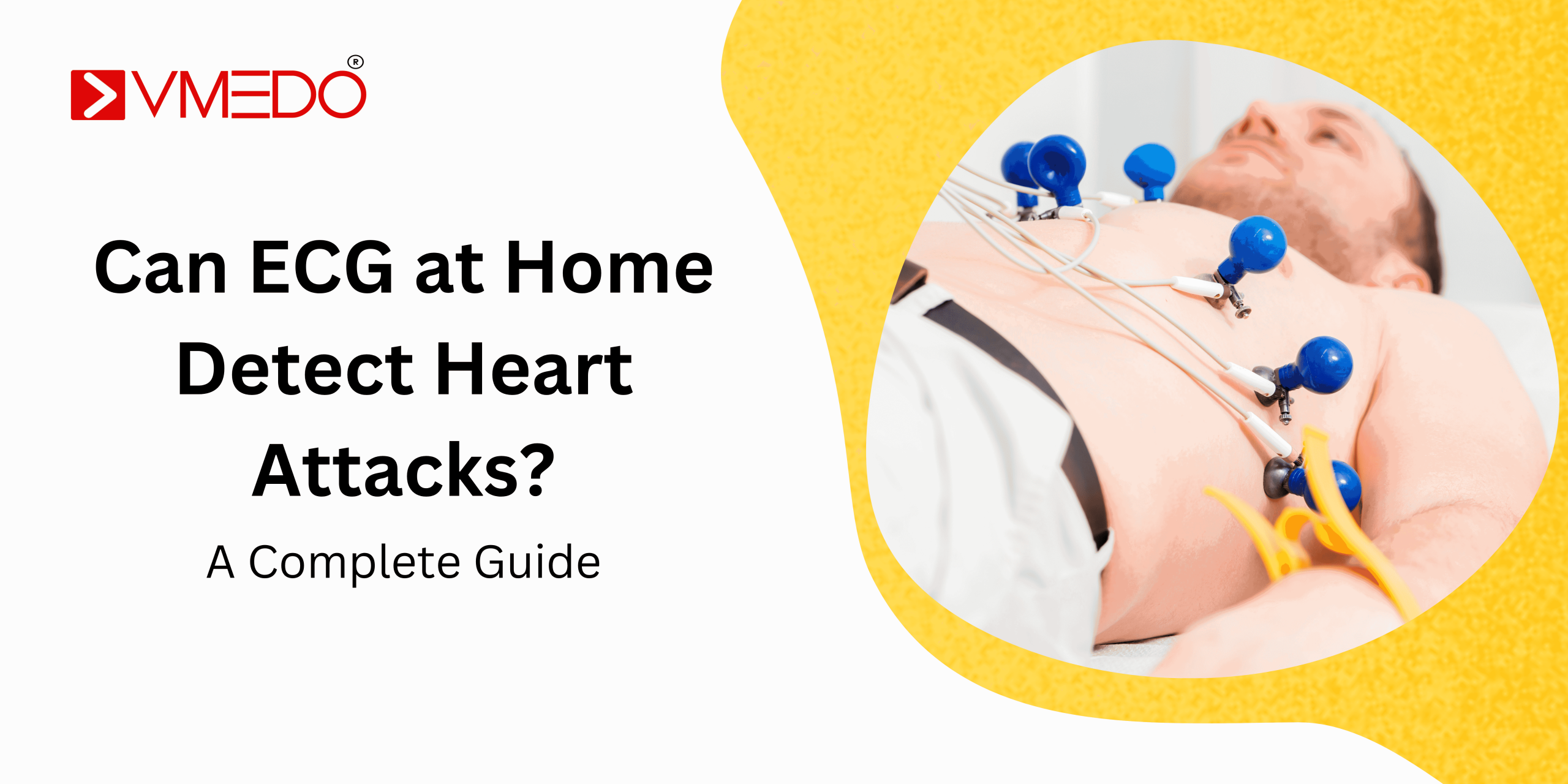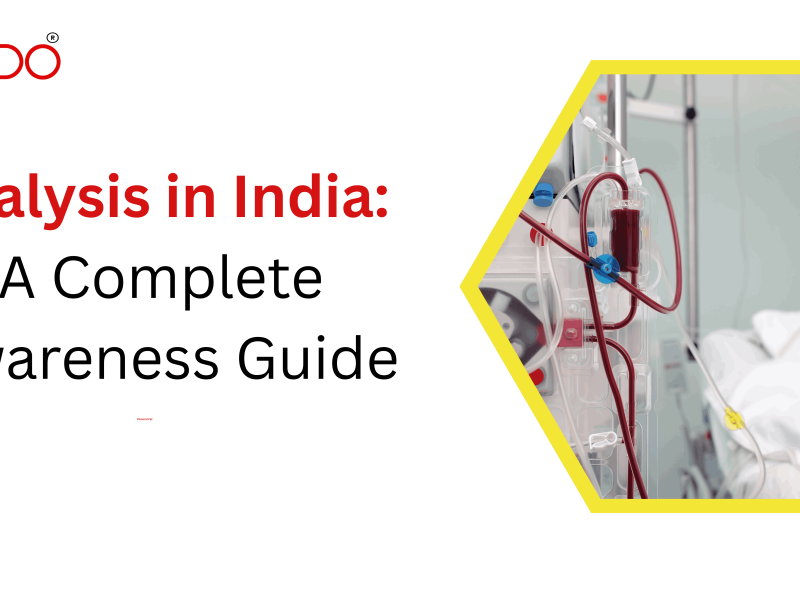Every second matters when it comes to a heart attack. The faster you detect it, the better the chances of survival. But what if that crucial detection could happen right in the comfort of your home — before it’s too late?
With the rising number of heart-related emergencies, especially in urban areas like Bangalore, the demand for quick and accessible heart monitoring solutions is growing rapidly. One such innovation that’s transforming emergency response is the ECG (Electrocardiogram) test at home. No more rushing through traffic, waiting in queues, or delaying care due to mobility issues — now a simple test can come to you.
But this raises a vital question:
Can an ECG at home truly detect a heart attack?
Is it reliable enough to trust with something so serious — potentially life-threatening?
In this blog, we break down the science behind ECGs, how they work in home settings, their role in detecting heart attacks, and how VMEDO is making life-saving diagnostics more accessible than ever. Whether you’re caring for an elderly parent, recovering from surgery, or simply want peace of mind, this guide is for you.
What is an ECG?
An Electrocardiogram (ECG or EKG) is a non-invasive diagnostic tool that records the electrical activity of the heart. It detects and displays these electrical impulses in the form of wave patterns on a graph, which healthcare professionals use to assess heart function.
An ECG Can Help Detect:
-
Irregular heartbeats (arrhythmias)
-
Heart enlargement
-
Poor blood flow to the heart
-
Previous heart attacks
-
Active or ongoing heart attacks (depending on timing and conditions)
What is a Heart Attack?
A heart attack (myocardial infarction) occurs when blood flow to a part of the heart is blocked, usually due to a blood clot in the coronary arteries. This blockage causes the affected part of the heart muscle to be deprived of oxygen and can lead to permanent damage or death if not treated promptly.
Common Symptoms of a Heart Attack:
-
Chest pain or pressure
-
Shortness of breath
-
Pain in arms, neck, jaw, or back
-
Nausea, lightheadedness
-
Cold sweats
-
Unusual fatigue
Important: Not everyone experiences classic chest pain; some may have “silent” heart attacks, especially in diabetics or elderly patients.
Can ECG at Home Detect a Heart Attack?
Yes, ECG at home can detect signs of a heart attack — but with some considerations.
An ECG detects abnormalities in the heart’s electrical activity, which often show up during or after a heart attack. If the test is done during the event, it can provide crucial evidence like:
-
ST elevation (STEMI – ST-Elevation Myocardial Infarction)
-
T wave inversions
-
Q waves indicating past damage
-
Rhythm changes (e.g., ventricular tachycardia)
However, detection depends on several factors:
-
Timing of the ECG
-
Lead placement accuracy
-
Experience of the technician
-
Interpretation by a qualified doctor
Limitations:
-
A single ECG may miss transient changes or silent ischemia.
-
It does not measure blood flow or blockages directly.
-
May be normal even in some heart attack patients (especially early on or with non-STEMI events).
How Does ECG at Home Work?
With VMEDO’s ECG at Home Service, trained medical professionals come to your home equipped with portable ECG machines. Here’s how the process typically unfolds:
1. Booking the Service
-
Call VMEDO or book online.
-
Choose your time slot and share patient details.
2. Technician Visit
-
A certified nurse or technician arrives with a portable ECG device.
-
The patient is asked to lie down in a comfortable position.
3. Electrode Placement
-
10 electrodes are placed on the chest, arms, and legs.
-
Skin may be cleaned or shaved slightly for better contact.
4. Recording the ECG
-
The ECG is recorded in 12-leads (standard format).
-
The report is printed or digitally generated.
5. Consultation
-
The report is shared with a cardiologist or general physician for interpretation.
-
In case of abnormal findings, further steps (ambulance, ER referral) are advised.
Who Should Consider ECG at Home?
-
People with Chest Pain or Discomfort
-
Elderly individuals with risk factors like hypertension, diabetes
-
Post-surgery or post-stent patients
-
Individuals with history of heart disease
-
Bedridden or mobility-impaired patients
-
Patients on heart medications (for monitoring)
Benefits of ECG at Home
| Benefit | Description |
|---|---|
| Time-Saving | No travel or waiting in hospital queues |
| Comfortable | Done in your own home, stress-free environment |
| Emergency-Ready | Quick action can be taken if abnormality is detected |
| Professional Service | Skilled technicians and physician-reviewed reports |
| Digital Reports | Easy to share with your cardiologist or family doctor |
| Affordable | Lower than hospital charges for ECG |
What to Do if ECG Shows Abnormality?
-
Stay calm.
-
Don’t move the patient unnecessarily.
-
Call an ambulance immediately.
-
Inform the hospital while en route.
-
Carry past reports or prescriptions.
ECG at Home vs. Hospital ECG
| Feature | ECG at Home | Hospital ECG |
|---|---|---|
| Convenience | High | Low |
| Wait Time | Minimal | High (esp. in emergencies) |
| Technician Attention | 1-to-1 | May be crowded |
| Cost | Affordable | Sometimes higher |
| Specialist Interpretation | Available digitally | Onsite |
| Emergency Action | Ambulance linked (VMEDO) | Immediate |
| Comfort Level | High | Low (travel, wait, stress) |
How to Know If You Need an ECG?
If you experience any of the following, don’t ignore:
-
Sudden chest pain or pressure
-
Fast or irregular heartbeats
-
Breathlessness
-
Fainting spells
-
Unusual fatigue or sweating
-
Radiating pain in arms/jaw/back
How VMEDO Makes ECG at Home Easy
VMEDO is a trusted name in emergency and urgent healthcare services across India. Our ECG at Home Service in Bangalore and other cities is built to save time, reduce panic, and deliver accurate results quickly.
Why Choose VMEDO?
-
24/7 availability
-
Trained professionals
-
Quick report turnaround
-
Coordination with cardiologists
-
Emergency ambulance support if needed
-
Affordable pricing
Conclusion
Heart attacks don’t always come with loud warnings — sometimes it’s a silent discomfort, a strange fatigue, or a fleeting chest pain. In those critical moments, access to timely diagnostics like an ECG can be the difference between life and death.
While an ECG at home may not replace a full hospital setup, it is a powerful first step in identifying warning signs of a heart attack. With trained professionals, portable equipment, and instant reporting, ECG at home has made cardiac care more accessible, especially for the elderly, chronically ill, or anyone facing sudden symptoms.
At VMEDO, we understand the urgency and sensitivity of heart-related issues. That’s why our ECG at Home service is designed to be quick, reliable, and patient-centered — bringing essential care right to your doorstep, without delay or discomfort.
If you or your loved one ever feels “something isn’t right” with the heart, don’t ignore it. Book an ECG at home immediately and get clarity before it’s too late. Because when it comes to your heart, there’s no such thing as being too early — but there is such a thing as being too late.
Take charge of your heart health. Stay alert, stay safe, and let VMEDO bring care to your home — when every second counts.



